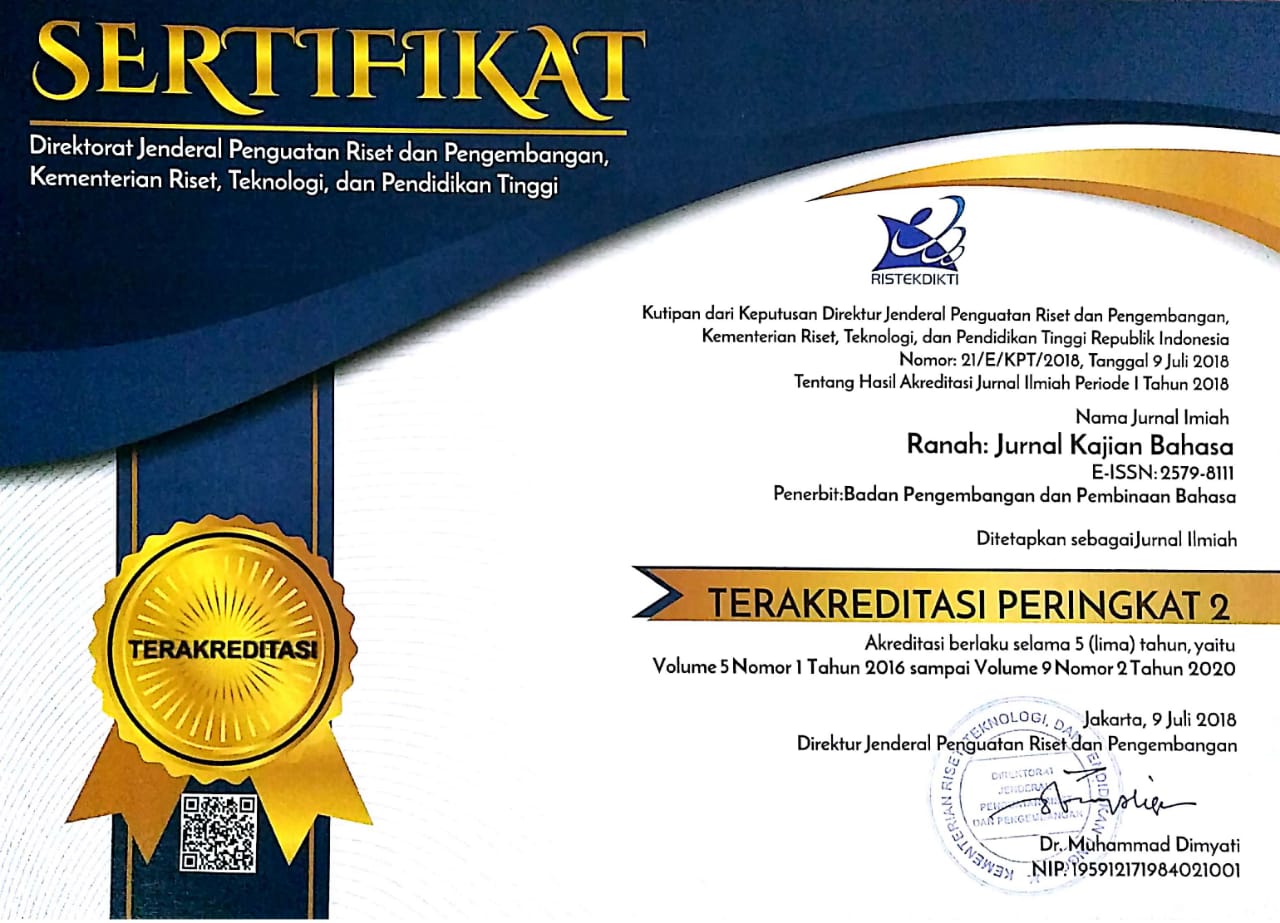Reconciling Conflicts of Canadian Racism Through Hegemony of Papal Apologies: Perspectives from Critical Discourse Analysis
Abstract
Apology is one of expressive speech acts aims to erase the wound. Speech texts, uttered by most influential people, has transactional function to emphasize the content of the apology as speech act itself. Pope’s apology is considered a significant moment to reconcile societal conflicts, especially indigenous Canadians. The strategy used by Pope in his apology was considered successful, because it received a positive response from the victim's family. This study describes Pope Francis' apology strategy to Indigenous Canadians using the CDA model presented by van Dijk and Foucault and the theory of apology strategy proposed by Trosborg. The data are taken from the speech transcripts derived from official websites and analyzed usik content analysis. Through the description of apology strategies, it can bea concluded that Pope Francis used direct and indirect strategies that show his effort to erase the racism issues in society. This also shown how hegemony handles the main role to overcome the issues of racism that has raised by the media. It is hoped to be investigated further to get more explanation of language roles to reconcile the conflicts.
Abstrak
Permintaan maaf merupakan salah satu tindak tutur ekspresif yang bertujuan untuk menghapus luka. Teks tutur yang dituturkan oleh orang-orang yang paling berpengaruh memiliki fungsi transaksional untuk menekankan isi permintaan maaf sebagai tindak tutur itu sendiri. Permintaan maaf Paus dianggap sebagai momen penting untuk mendamaikan konflik masyarakat, khususnya masyarakat adat Kanada. Strategi yang digunakan Paus dalam permintaan maafnya dinilai berhasil, karena mendapat tanggapan positif dari keluarga korban. Penelitian ini menguraikan strategi permintaan maaf Paus Fransiskus kepada masyarakat adat Kanada dengan menggunakan model CDA yang dikemukakan oleh van Dijk dan Foucault serta teori strategi permintaan maaf yang dikemukakan oleh Trosborg. Data diambil dari transkrip tuturan yang diperoleh dari situs web resmi dan dianalisis menggunakan analisis isi. Melalui uraian strategi permintaan maaf, dapat disimpulkan bahwa Paus Fransiskus menggunakan strategi langsung dan tidak langsung yang menunjukkan upayanya untuk menghapus isu rasisme di masyarakat. Hal ini juga menunjukkan bagaimana hegemoni memegang peranan utama untuk mengatasi isu rasisme yang diangkat oleh media. Diharapkan dapat diteliti lebih lanjut untuk mendapatkan penjelasan lebih lanjut tentang peran bahasa untuk mendamaikan konflik tersebut.
Keywords
Full Text:
PDFReferences
Ahsanu, M. (2013). Aceng's Unforgiven Apology: An Interdisciplinary Critical Discourse Analysis. Kandai, 9(1), 36-49. https://doi.org/10.26499/jk.v9i1.280
Alfghe, A., & Mohammadzadeh, B. (2021). Realization of the Speech Act of Request, Suggestion, and Apology by Libyan EFL Learners. SAGE Open, 11(4). https://doi.org/10.1177/21582440211050378
Allan, K. (2014). Linguistic Meaning. In Linguistic Meaning. Routledge and Kegan Paul. https://doi.org/10.4324/9781315880297
Allan, Keith and Kate Burridge. 1991. Euphemism and Dysphemism: Language Used as Shield and Weapon. Oxford: Oxford University Press
Anggraini, Indrani Dewi. (2020). Makna Paradoksikal Pidato Kevin Rudd: The Apology to the Stolen Generation of Australia (AWK Model Norman Fairclough). Konferensi Linguistik Tahunan Atmajaya 18, 216-221
Chaemsaithong, K. (2006). A Historical Pragmatic Study of Apologies: A Case Study of the Essex Apology: A speech act. MANUSYA: Journal of Humanities, 17(Special Issue), https://doi.org/10.1163/26659077-01203007
Darma, Y. A. (2009). Analisis Wacana Kritis. Yrama Widya.
Darma, Y. A. (2014). Analisis Wacana Kritis: dalam Multiperspektif. Refika Aditama.
Eriyanto. (2001). Analisis Wacana: Pengantar Analisis Teks Media. Yogyakarta: LKis
Falco, G., Degli, U., Di, S., & Moro, B. " A. (2021). What Consumers Really Feel About Corporate Apologies: A Discourse Analysis of Reactions to Apologies on Economic And Financial Scandals in Tweets. Lingue Linguaggi, 44, 143-157. https://doi.org/10.1285/i22390359v44p143
Ghenaati, Z., & Naeini, M. B. (2019). Interrelationships of emotional intelligence with the awareness of request and apology strategies in an EFL setting. Indonesian Journal of Applied Linguistics, 9(1), 148-156. https://doi.org/10.17509/ijal.v9i1.14486
Hanson, Erin. (2019). Sixties Scoop. https://indigenousfoundations.arts.ubc.ca/sixties_scoop/
Jacobson, M. (2004). Apologies and Apologetic Attitude in Early Modern English. Nordic Journal of English Studies, 3(3), 187. https://doi.org/10.35360/njes.62
Kalinina, Galina Sergeevna, et.al. (2019). "The Intention of 'Apology' in Speech Etiquette: Based on the Material of Different Structural Languages" in Journal of Research in Applied Linguistics: Special Issue, 11, 292-299
Liu, S., & Li, X. (2021). A Multimodal Critical Discourse Analysis of Corporate Apologies by Starbucks CEO from the Perspective of Crisis Management. Scientific and Social Research, 3(2), 114-123. https://doi.org/10.36922/ssr.v3i2.1115
Martinet, N. del C. (2013). Illocutionary Constructions in English: Cognitive Motivation and Linguistic Realization. Peter Lang.
Masita, E. (2021). Students'Apology Realization Patterns in Online Classes During the Pandemic-19. English Language and Literature International, 4
Noda, Mode. (2017). Religion, Liturgy and Ethics, at the Intersection between Theory and Practice. The Revolution of Pope Francis. In Journal for the Study of Religions and Ideologies, 16(46), 17-33
Pala, M. (2015). Foucault's Discourse and Gramsci's Hegemony as Instruments of Critical Engagement in the Age of Globalization. Between, 5(10). https://doi.org/10.13125/2039-6597/2028
Paramasivam, S., Varma, S & Nimehchisalem, V. (2019). Linguistic Construction of a Winning Apology. Journal of Research in Applied Linguistics, 10. 3-31. https://doi.org/10.22055/rals.2019.14177
Shahab, Sara et. al. (2019). "Peeling the Onion: A Textual CDA of Research Articles in Humanities and Basic Sciences" in Journal of Research in Applied Linguistics, 10(1), p. 108-131
Shevchenko, I., & Gutorov, V. (2019). A Cognitive-Pragmatic Perspective on Apologies in English and Ukrainian Discourse. 4(2), 301-341
Shim, J. (2009). A Study of Apology Strategies between Genders in EFL College Students. English Language & Literature Teaching, 15(2), 225-243
Shukla, S., & Shukla, R. (2018). Public apologies in India - Semantics, sentiment and emotion. GWC 2018 - 9th Global WordNet Conference, 2018-Janua
Sixties Scoop. (2009). https://indigenousfoundations.arts.ubc.ca/sixties_scoop/
Sobur, A. (2015). Analisis Teks Media. Remaja Rosdakarya.
Sumarlam. (2021). Materi Kuliah Critical Discourse Analysis. Unpublished Lecture Material Paper
Trosborg, Anna. (1994). Interlanguage Pragmatics: Requests, Complaints and Apologies. New York: Mouton de Gruter. https://doi.org/10.1515/9783110885286
Van Dijk, T.A. (1991). Racism and the Press. London: Routledge.
Van Dijk, T.A. (1993). Elite Discourse and Racism. London: Sage Publications. Pp.242-282. https://doi.org/10.4135/9781483326184
Van Dijk,T. A. (1997). Discourse as Structure and Process of Discourse Studies: A Multidisciplinary Introduction. London: SAGE Publications. https://doi.org/10.4135/9781446221884
Van Dijk, T.A. (2001). "Multidisciplinary CDA," in Methods of Critical Discourse Analysis, R. Wodak and M. Meyer (Editors). Great Britain: SAGE Publications
Van Dijk,T. A. (2015).The Handbook of Discourse Analysis, 2nd ed. John Wiley & Sons Inc.
Yule, G. (1996). Pragmatics. Oxford University Press.
DOI: https://doi.org/10.26499/rnh.v13i2.6528
Refbacks
- There are currently no refbacks.








